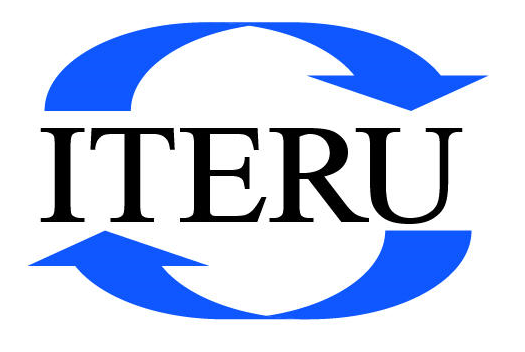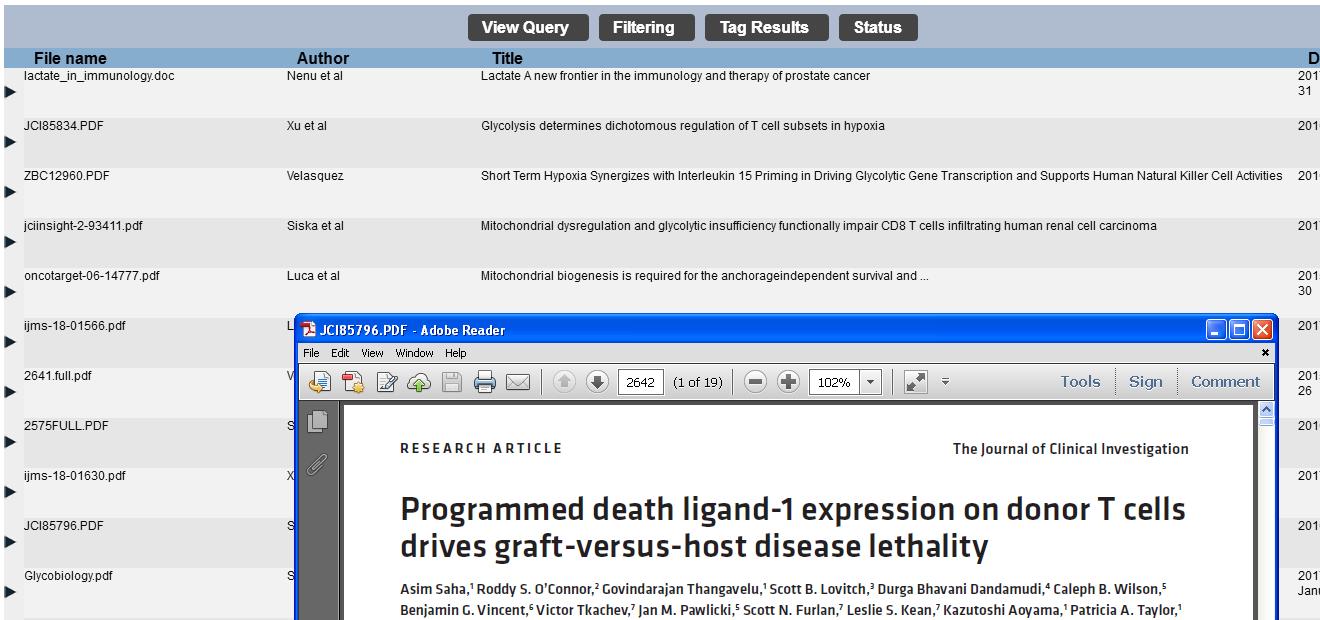Iteru’s Case Studies
your employees can find the answer
Pharma R&D Analytics
Pharma R&D Problems Need Long Term SolutionsThe pharma industry has entered a severe innovation crisis that has caused a persistent decline in R&D productivity and revenue. There is an urgent need to change the current R&D model so as to decrease the cost of a new drug and overcome the challenges of cancer treatment.
AI Is A Good Solution To Pharma R&D ProblemsPharma industry is one of the most, if not the most, data intensive industry. The data sources are scientific journals, electronic medical records, genomics, screening data, patents, FDA data, internal documents such as reports and results of lab work, etc. Using data analytics and AI software to extract insights improves pharma R&D. In this respect, pharma data analysis becomes a software problem. The cost of a scalable software infrastructure is very low. Applying software solutions to pharma R&D brings significant reduction in drug development costs and time
Case Study 1
Iteru’s AI for Cancer Drug Discovery
AI accuracy depends on data accuracy, consistency and completeness. In sentiment analysis for marketing and customer service, the accuracy is only about 68%. For semiconductor defect 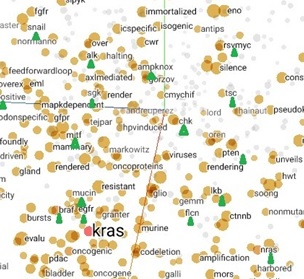 detection accuracy is about 95%. Like with semiconductor, AI for the spectacularly expensive drug discovery, where the cost of a drug development can run into billions of dollars, accuracy should be greater than 90%. This leads to precise relationships between drugs, targets, and diseases. Lack of accuracy is one of the reasons why a well-publicized AI product failed to provide solutions to cancer treatment. To attain high accuracy Iteru developed powerful preprocessing algorithms to cleanse biomedical data and filter out inconsequential data prior to feeding the data to AI algorithms. Concerning completeness, Iteru processes all content not just abstracts. The results obtained indicate that Iteru is in the right path to attain 90% accuracy.
detection accuracy is about 95%. Like with semiconductor, AI for the spectacularly expensive drug discovery, where the cost of a drug development can run into billions of dollars, accuracy should be greater than 90%. This leads to precise relationships between drugs, targets, and diseases. Lack of accuracy is one of the reasons why a well-publicized AI product failed to provide solutions to cancer treatment. To attain high accuracy Iteru developed powerful preprocessing algorithms to cleanse biomedical data and filter out inconsequential data prior to feeding the data to AI algorithms. Concerning completeness, Iteru processes all content not just abstracts. The results obtained indicate that Iteru is in the right path to attain 90% accuracy.
Case Study 2
Drug Repurposing
Iteru’s proprietary algorithms are used to demo repurposing of drugs already approved for other conditions. Repurposing, also referred to as repositioning, offers a number of significant advantages 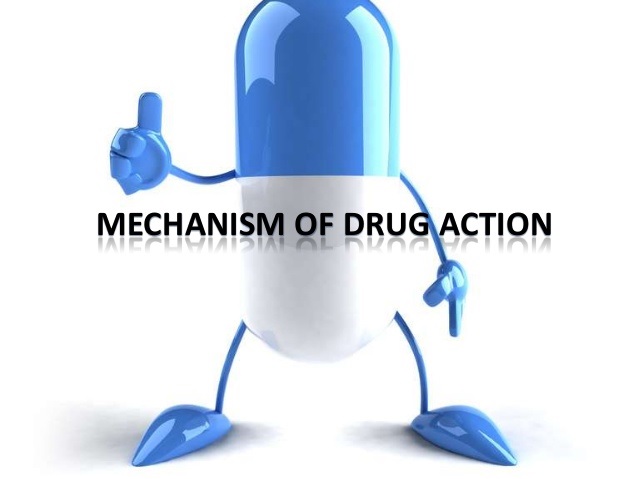 in comparison with de novo drug development. These include the availability of extensive pharmacokinetic, pharmacodynamic and safety data, resulting in significant cost reduction. The algorithms are applied to published data and are based on analysis of the mechanism of action. In addition to repurposing, the data analysis provides information about side effects and toxicity. The process could be used for new drug discovery, extract insights from FDA data and internal pharma data (laboratory data, emails, etc.)
in comparison with de novo drug development. These include the availability of extensive pharmacokinetic, pharmacodynamic and safety data, resulting in significant cost reduction. The algorithms are applied to published data and are based on analysis of the mechanism of action. In addition to repurposing, the data analysis provides information about side effects and toxicity. The process could be used for new drug discovery, extract insights from FDA data and internal pharma data (laboratory data, emails, etc.)
Security & Forensics
Data Security
The impact of security threats is rising in the US, with the average cost of a data breach now over $7 million. This covers the cost of resolving an attack, business disruption, regulatory fines, legal fees, and other costs. There is also negative impact on an organization’s brand and reputation and potential loss of customers. According to CB Insights, in the last five years alone, $13.2 billion has been invested in security-related private companies. Nevertheless, breaches and ransomware attacks has been relentless. To quote Sequoia Capital, “it’s very hard to build an enduring security company”.
Iteru’s Strategy: All Data Is Under Purview
Iteru classifies and tags all data and metadata. This renders all data under IT and analysts purviews. Classification of all data is a solid foundation upon which solutions for security and risk management could be built. Data is continuously scanned to discover exposed data, identify breaches, eliminate data loss, proactively identify where leakage may occur, fix broken processes and prevent insider violations. Iteru can manage data in multiple clouds. Its algorithms can play an important role in the ever evolving problems of cybersecurity/data security and forensics.
Case Study 3
Forensics: Enron Scandal
Enron Corp. was a company that reached dramatic heights, only to face a dizzying collapse. Its story is well known. The Federal Energy Regulation Commission found that Enron Corporation deliberately defrauded California out of billions during the 2000-2001 California energy crisis, reaping vast profits in the state’s newly deregulated energy market. At the conclusion of the investigation, Enron’s emails were deemed to be in the public domain, to be used for historical research and academic purposes.
Iteru Analysis of Enron Email Corpus
Iteru selected Enron emails because they are the only publicly available mass collections of “real” emails. It consists of 600,000 emails generated by 158 employees. The objective of Iteru’s analysis was to answer the following questions:
- Did lobbyists influence Federal Energy Regulatory Commission (FERC)?
- Why solutions based on re-regulation or price cap were not adopted?
- How did Enron mislead Europe?
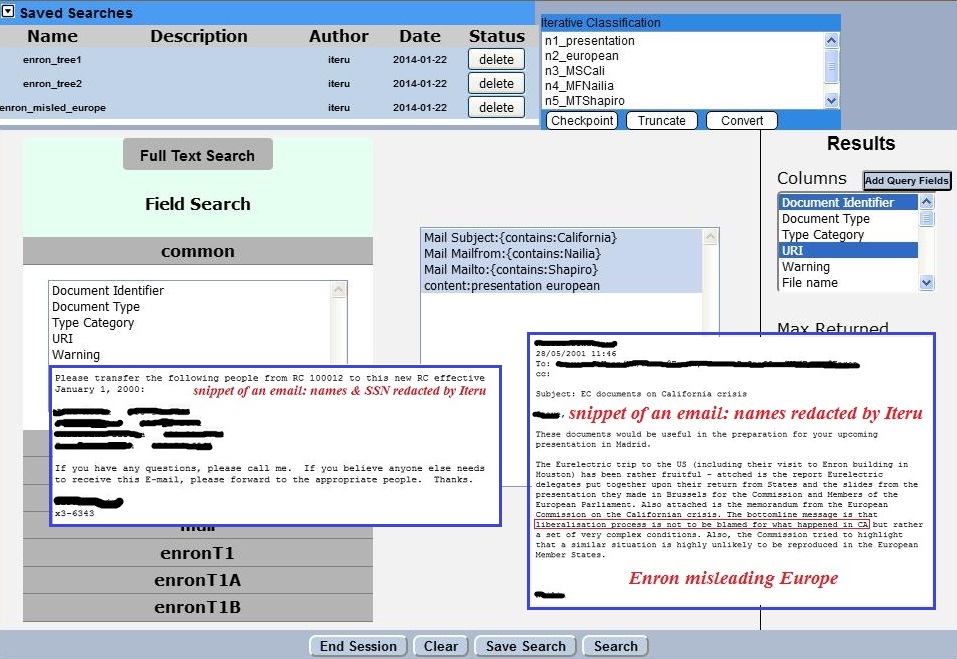
Iteru’s Solution
Iteru extracted and classified all the metadata and the email body. The analysis uncovered the following:
- Emails show how the lobbyists influenced FERC.
- Enron convinced FERC not to adopt a solution based on price cap.
- Enron misled European officials by claiming California deregulation has nothing to do with the energy crisis and the crisis will not happen in European Member States.
Incidentally, Iteru found that the emails which were released by the government 14 years ago (2003), include tens of SSN (Social Security Number) of Enron share holders.
